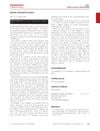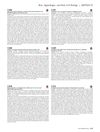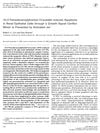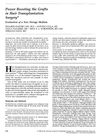 177 citations,
July 2004 in “The Journal of Sexual Medicine”
177 citations,
July 2004 in “The Journal of Sexual Medicine” Experts recommend thorough medical, sexual, and psychosocial assessments for women's sexual dysfunctions, and suggest individualized treatment plans with regular check-ups. They also mention potential use of estrogen and androgen therapy, but with caution due to safety concerns.
 80 citations,
April 2018 in “Trends in Molecular Medicine”
80 citations,
April 2018 in “Trends in Molecular Medicine” Lichen Planopilaris and Frontal Fibrosing Alopecia may help us understand hair follicle stem cell disorders and suggest new treatments.
 9 citations,
October 2017 in “Molecular Medicine Reports”
9 citations,
October 2017 in “Molecular Medicine Reports” Finasteride causes reduced tear flow and severe eye inflammation.
 1 citations,
April 2016 in “British Journal of Dermatology”
1 citations,
April 2016 in “British Journal of Dermatology” Buschke-Ollendorff syndrome is a rare genetic disorder causing skin and bone changes, with some cases also showing ADHD or developmental delays.
 115 citations,
October 2009 in “The Journal of clinical endocrinology and metabolism/Journal of clinical endocrinology & metabolism”
115 citations,
October 2009 in “The Journal of clinical endocrinology and metabolism/Journal of clinical endocrinology & metabolism” The research found that Atypical Progeroid Syndrome has unique symptoms and is not caused by the buildup of a certain mutant protein.
 May 2021 in “Boletín latinoamericano y del Caribe de plantas medicinales y aromáticas”
May 2021 in “Boletín latinoamericano y del Caribe de plantas medicinales y aromáticas” Microsechium helleri extract has antioxidant, anti-inflammatory, antidiabetic, and heart-protective benefits.
 1 citations,
November 2019 in “Archives of breast cancer”
1 citations,
November 2019 in “Archives of breast cancer” Some hormone treatments might raise breast cancer risk, while others don't seem to.
 April 2018 in “The journal of investigative dermatology/Journal of investigative dermatology”
April 2018 in “The journal of investigative dermatology/Journal of investigative dermatology” GATA6 is important for maintaining and differentiating cells in a key area of human skin.
 November 2023 in “Bioorganic Chemistry”
November 2023 in “Bioorganic Chemistry” Drugs targeting the Androgen Receptor are effective for treating prostate cancer and other androgen-related conditions.
 4 citations,
January 2001 in “Archives of Biochemistry and Biophysics”
4 citations,
January 2001 in “Archives of Biochemistry and Biophysics” Activated ras can protect kidney cells from a certain substance that causes cell death.
 25 citations,
March 2017 in “Experimental Dermatology”
25 citations,
March 2017 in “Experimental Dermatology” The document concludes that understanding hair follicles requires more research using computational methods and an integrative approach, considering the current limitations in hair treatment products.
 336 citations,
August 2015 in “European Journal of Epidemiology”
336 citations,
August 2015 in “European Journal of Epidemiology” The Rotterdam Study found risk factors for elderly diseases, links between lifestyle and genetics with health conditions, and aimed to explore new areas like DNA methylation and sensory input effects on brain function.
 266 citations,
November 2013 in “European Journal of Epidemiology”
266 citations,
November 2013 in “European Journal of Epidemiology” The Rotterdam Study aims to understand disease causes in the elderly and has found new risk factors and genetic influences on various conditions.
 39 citations,
January 2012 in “Indian Dermatology Online Journal”
39 citations,
January 2012 in “Indian Dermatology Online Journal” Finasteride may cause sexual side effects like erectile dysfunction, but they are reversible and affect less than 2% of men.
 22 citations,
December 1998 in “Dermatologic Surgery”
22 citations,
December 1998 in “Dermatologic Surgery” A new storage solution may increase hair transplant graft survival.
 December 2024 in “Highlights in Science Engineering and Technology”
December 2024 in “Highlights in Science Engineering and Technology” Stem cells show promise for hair regrowth, but challenges remain.
 3 citations,
July 2011 in “Expert Review of Dermatology”
3 citations,
July 2011 in “Expert Review of Dermatology” Effective treatments for excessive hair growth in women include creams, laser therapy, and medications, with the choice depending on individual needs and potential side effects.
 13 citations,
January 2021 in “RSC chemical biology”
13 citations,
January 2021 in “RSC chemical biology” Wnt activation shows promise for regenerative medicine but requires selective targeting to minimize risks like cancer.
3 citations,
November 2022 in “International journal of molecular sciences” Bio-pulsed stimulation increases production of beneficial vesicles from bird stem cells that improve skin and hair cell functions.
 320 citations,
December 2018 in “Frontiers in Immunology”
320 citations,
December 2018 in “Frontiers in Immunology” Changing how mesenchymal stromal cells are grown can improve their healing abilities.
 80 citations,
April 2017 in “Frontiers in Pharmacology”
80 citations,
April 2017 in “Frontiers in Pharmacology” PDRN helps repair tissue and improve wound healing with a high safety profile.
 7 citations,
July 2019 in “International Journal of Molecular Sciences”
7 citations,
July 2019 in “International Journal of Molecular Sciences” PGA-4HGF may help treat hair loss by activating hair growth pathways and extending the hair growth phase.
 58 citations,
January 1987 in “Archives of Dermatological Research”
58 citations,
January 1987 in “Archives of Dermatological Research” EGF and FGF boost hair cell growth, hydrocortisone slows it, and minoxidil doesn't affect it.
 5 citations,
January 2023 in “Cell proliferation”
5 citations,
January 2023 in “Cell proliferation” Chick embryo extract helps rat hair follicle stem cells potentially turn into Schwann cells, important for the nervous system.
 January 2019 in “ISGE series”
January 2019 in “ISGE series” The document concludes that effectively managing PCOS requires a multifaceted approach.
 102 citations,
February 2008 in “The FASEB Journal”
102 citations,
February 2008 in “The FASEB Journal” One minoxidil-sensitive potassium channel exists in human hair follicles.
 September 2022 in “Research Square (Research Square)”
September 2022 in “Research Square (Research Square)” Caffeic acid helps protect rats from the harmful effects of acrylamide.
 437 citations,
August 2014 in “Cell metabolism”
437 citations,
August 2014 in “Cell metabolism” Turning white fat into brown-like fat could help fight obesity and type 2 diabetes.
 1 citations,
April 2020 in “Clinical, Cosmetic and Investigational Dermatology”
1 citations,
April 2020 in “Clinical, Cosmetic and Investigational Dermatology” Acyclovir cream may slow down hair growth, suggesting it could be a new treatment for excessive hairiness.
 91 citations,
April 2011 in “Journal of Ethnopharmacology”
91 citations,
April 2011 in “Journal of Ethnopharmacology” Polygonum multiflorum extract helps grow hair by activating certain hair growth signals in mice.




























